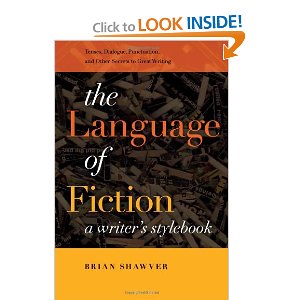 You might think grammar is boring, but it is the writer’s toolbox. I marvel each time I sit down to write that I can create a blogpost or a scene in a novel or a poem from various combinations of twenty-six letters and a few punctuation marks. That’s all I have to work with. I need to know how to combine those letters and punctuation marks into the right words and the right sentences to say what I mean and to give each sentence and paragraph the focus I want.
You might think grammar is boring, but it is the writer’s toolbox. I marvel each time I sit down to write that I can create a blogpost or a scene in a novel or a poem from various combinations of twenty-six letters and a few punctuation marks. That’s all I have to work with. I need to know how to combine those letters and punctuation marks into the right words and the right sentences to say what I mean and to give each sentence and paragraph the focus I want.
For my birthday this year, my husband gave me a book, The Language of Fiction, a Writer’s Stylebook, by Brian Shawver. At first I wasn’t too thrilled. After all, it is a book on grammar. And I think I know grammar pretty well.
I learned some grammar from the nuns in 7th and 8th grade. One even taught us to diagram sentences, which I, unlike most of my classmates, found somewhat enjoyable. A place for everything and everything in its place.
But most of my English grammar I learned in my French, German, and Russian classes in high school and college. How could I learn how to decline nouns and conjugate verbs if I didn’t understand each word’s role in the sentence? I learned the difference between direct and indirect objects, dative and possessive cases, transitive and intransitive verbs, simple past tense and present perfect and past perfect, all for my foreign language classes.
But, although I know grammar pretty well already, I still want to become a better fiction writer. And because my husband had clearly taken care to find me a book he thought I would like and would find useful, I delved into The Language of Fiction. And found that Mr. Shawver’s book is really more of a how-to guide for writers than an instructional text on grammar.
The book focuses on grammar and style issues that are relevant to fiction writers. The author does explain the rules of grammar, but then he explains when and how writers of fiction and creative non-fiction (memoirs and personal essays) can and should break the rules.
Yes, creative writers need to know the rules. But they also need to know when to break them.
For example, had I been following the traditional rules of grammar we were taught in school, my last paragraph would have read “Creative writers need to know the rules, but they also need to know when to break them.” But that sentence – without the “yes” for emphasis at the beginning, and without the sentence break before the “But” (beginning a new sentence with a conjunction – horrors!) – would not have read as well. It just wouldn’t have conveyed the same flavor as the split sentence. In my humble opinion.
Mr. Shawver’s book is divided into several parts: stylistic decisions, fundamentals of language, nuances of punctuation, and common errors. The style section looks at use of verb tenses and how to portray characters’ dialogue and internal thoughts. The fundamentals of language section has chapters on past perfect (anyone remember what that is?), pronouns, adverbs, participial phrases (another term you may not have heard of since middle school), and diction. The punctuation section focuses on sentence fragments, commas, dashes and other marks for separation, and exclamation points and italics. The errors he examines include verb tense shifting, commas, and clichés.
The writers who are reading this are probably nodding their heads. These topics are all issues we have dealt with in our writing.

The rest of you may be nodding off. That’s okay.
But if you want to know more about grammar, particularly if you want to write, I highly recommend Brent Shawver’s The Language of Fiction, a Writer’s Stylebook. I’d loan you my copy, but it’s full of my highlights; I want to keep it.
And I confess: I still hate the Oxford comma, even though it is back in style these days, and I reluctantly use it.
What points of grammar are the hardest for you?




I agree, Theresa. He hits the surface of the subject, preventing it from becoming a reference book. Thus, a readable book on an import subject.
All grammar is hard for me.
Theresa,
Thanks for the review of the book. I grew up moving many times and school systems across the U.S. and overseas don’t all track the same…and I think they should. The focus in English class was on speed reading and comprehension, thus my spelling skill suck (I do like alliteration). For some reason, I’m the queen of dangling modifiers.
Clearly the book is one I need.
Smiles,
Linda Joyce
Present perfect, past perfect, future perfect, loved it all and sentence diagrams too. Sounds like a book tht would be a great source.
.
I love how you talk about knowing when to break the rules of grammar to make the sentence more interesting. I agree the whole point of reading is that it should be enjoyable. When it comes to writing, a little flavor goes a long way!! Well, said : )
Thanks, Kirsten. It’s a matter of finding our voice and feeling free to use it.
Theresa
[…] Well, there’s one difference between us. I merely tolerate the Oxford Comma. What are your readers saying about Along the Way […]
[…] on writing—many on the techniques of writing fiction, some on the writing life, and a few on grammar. But I didn’t read anything on teaching creative writing; that was too far beyond my […]